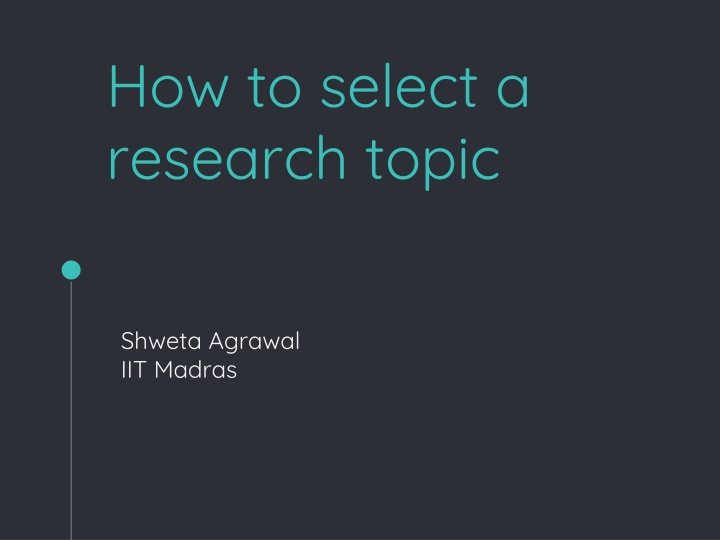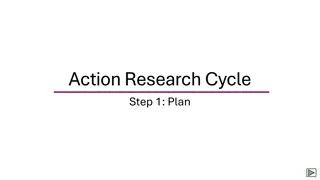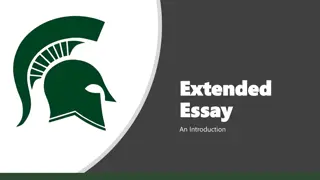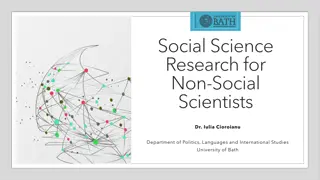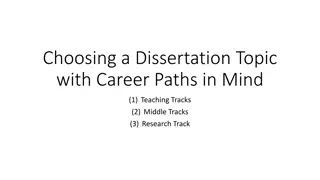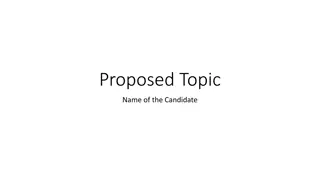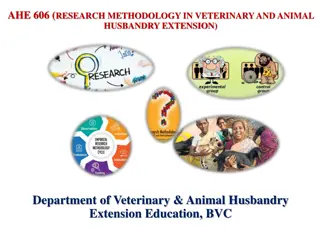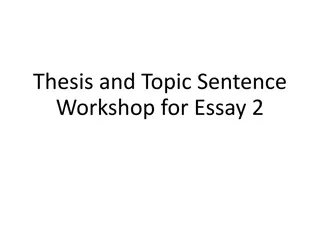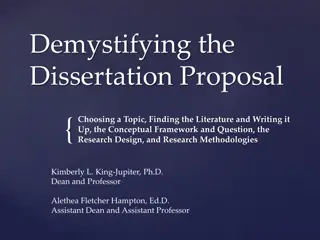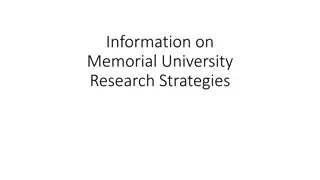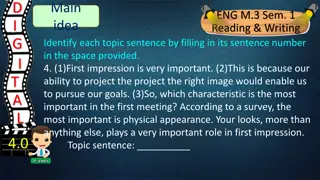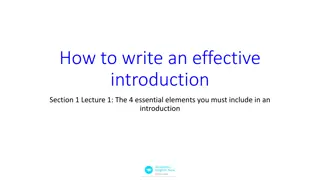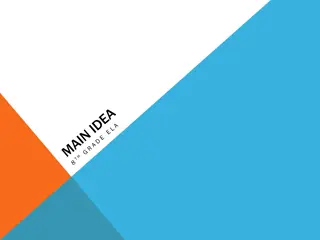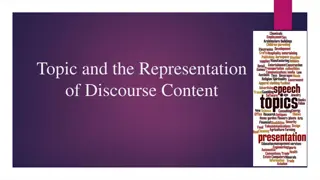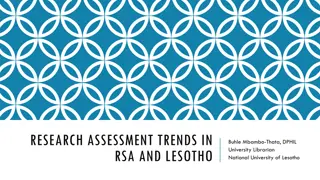Effective Strategies for Choosing a Research Topic
Choosing a research topic involves dropping modesty, nurturing a desire for excellence, and finding a balance between feasibility and interest. Consider grand challenges and the Pareto principle for optimal problem selection as you progress in your career.
Download Presentation

Please find below an Image/Link to download the presentation.
The content on the website is provided AS IS for your information and personal use only. It may not be sold, licensed, or shared on other websites without obtaining consent from the author.If you encounter any issues during the download, it is possible that the publisher has removed the file from their server.
You are allowed to download the files provided on this website for personal or commercial use, subject to the condition that they are used lawfully. All files are the property of their respective owners.
The content on the website is provided AS IS for your information and personal use only. It may not be sold, licensed, or shared on other websites without obtaining consent from the author.
E N D
Presentation Transcript
How to select a research topic Shweta Agrawal IIT Madras
How to select a research topic: A theorist s perspective
How to select a research topic: A theorist s perspective
The most important thing before you choose a problem Drop modesty and say to yourself, Yes, I would like to do first-class work. -Richard Hamming
Dropping Modesty Have the desire to do excellent work The faith that you can The willingness to put in what it takes (much toil, many failures and frustration, much patience) Attitude that one starts with is important! But this must be cultivated systematically
THE TWO DIMENSIONS OF PROBLEM CHOICE 1 (From essay by Uri Alon)
Feasibility Versus Interest Easy-but-not-too-interesting, a.k.a. low-hanging fruit. Both difficult and have low interest: hard equals good? Grand challenges: tough problems with the potential to considerably advance understanding. Desirable: feasible and with high interest, likely to extend our knowledge significantly.
Pareto principle of optimization theory If problem A is better on both axes (feasibility and interest) than problem B, one can erase B from the diagram. Applying this criterion to all problems, one is left only with problems for which there are no problems clearly better in both feasibility and interest. These remaining problems are on the Pareto front Optimal problems move along the Pareto front as a function of the life stages of the scientist.
Problem choice in early stages Maintain healthy balance between hard and reachable Don t prematurely obsess on a single big problem or big theory Terry Tao Try to work with other people Do not be shy to ask for help if things are not working out These are things I learned the hard way
All eggs in one basket: Personal When I started my postdoc, I worked essentially alone for > 1 year almost exclusively on two big problems One was solved by another group, one remains open to this day (5 years later) I felt I was doing something wrong, didn t discuss Lost confidence, came close to quitting Upside: Research was never so hard after that
Taking the time It takes time to find a good problem Do not be in a hurry to get to work . Savour the process of finding a nice problem. Be creative in how you choose the problem. Don t rush for the first, most obvious question (it gets crowded out there) Be original. What *you* like is important. Stay committed to what is interesting to you.
What is interesting? In the early stages, if you want to be safe, you can tackle modest improvements over papers that appeared in reputable venues As you gain confidence, branch out to more creative questions Interesting = publishable? Who decides? What others think is important but not as important as what you think. If we are genuinely interested, then failures and setbacks (inevitable and plentiful) do not seem so bad
Interesting=Publishable? Personal Once I got involved in a project because I confused interesting (to me) with publishable Paper was rejected multiple times. Didn t really like the question but had to keep coming up with new ways to sell it. Another paper that took equally long to publish but I liked and believed in it. Rewriting helped improve it. Satisfied in the end. Don t work on things just because you think they are interesting to others.
There is confusion due to the mixing of two voices one is a loud voice of the interests of those around us, in conferences, in our department, etc. The other is a faint voice in our breast, that says, this is interesting to me. Listening to our own idiosyncratic voice leads to better science. -Uri Alon
Being inspired while choosing a problem A concrete method I have is to maintain a stash of papers that I have found innovative, inspiring and cool I periodically look at these to rediscover what I love about my research area. Keep adding to this stash. When I feel inspired, I try to think of open directions Choose problems with a fresh mind, e.g. morning
Seeking new problems Useful to read abstracts of many papers, to know landscape See many talks/slides to have high level idea of work across the space Think wild . Forget about details, hurdles etc. Allow the craziest of ideas. Listen to music. Have fun.
It is six in the morning. The house is asleep. Nice music is playing. I prove and conjecture. -Paul Erdos
Then, stop being wild and lace up! After the dreamy phase where all ideas are welcome, play devil s advocate and try to look at why any one would make sense Do thorough literature survey. Keep abreast. Stop reading and start moving. Knowing all the details of all science done is unnecessary (and impossible)
When I got (PhD) I knew almost nothing about physics. But I did learn one big thing: that no one knows everything, and you don t have to. -Steven Weinberg
Going for the mess (and sticking on) My advice is to go for the messes - that s where the action is Steven Weinberg Once chosen, be diligent. Don t give up till you have tried enough, and understand why you are not able to make progress (eg techniques not enough?) Even if you have to abandon a problem, make sure you learn something from it. Quantify this and write it down.
Keep at it Talk about research to peers. You ll get ideas. Attend and give many talks. Ask many questions. This leads to new problems. Be sceptical when choosing a problem. Place any question on the map of known results and check if it is surprising.
Being sceptical: Personal In crypto, we prove security against adversaries (modelled as algorithms) In one paper in 2011, I could only prove a weaker property than I wanted. The adversary in my proof was limited I kept trying to generalize the proof and failed each time In 2016, it occurred to me, is it actually true that the proof can be generalized? Within half an hour, I had an attack against the scheme, if a general adversary was considered Always ask: can what I am trying to prove true actually be false ?
Final Thoughts In choosing and later, try to keep the fun alive Should not become all about slog (though you ll need to work very hard) Work hard, but work smart Get used to failure. Keep learning.
Thank you! References: Richard Hamming: You and your research Uri Alon: How to choose a good scientific problem Steven Weinberg: Four Golden Lessons
